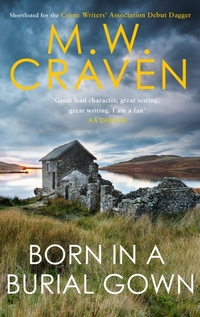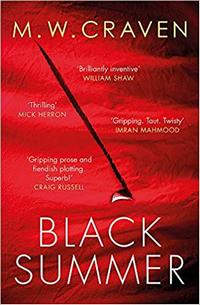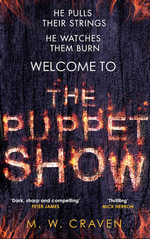 |
Born in a Burial Gownby M. W. Craven Paperback, 331 pg. Read: March 12-16, 2021 |

Find out how the victim lived and you’ll find out how they died.
Here We Go Again
You may be asking yourself, is this just another instance of The Irresponsible Reader raving about a book by M. W. Craven? Yup. This is the fourth novel that I’ve read (of the five published to date), and I’m not sure there’s another acceptable response to his books.
What’s Born in a Burial Gown About?
I have no idea if that sentiment about how the victim lived would be shared by actual detectives, but it works pretty well for Detective Inspector Avison Fluke and his team—which is why Fluke keeps repeating it.
In this particular case, a homeless drug-addict sees someone burying a golf bag at the construction site that he’s using as a temporary shelter. He leaves a note for the construction manager and bugs out. When Fluke and the other police arrive, they find a woman in a golf bag, buried in a way that will soon be covered by the construction. If it hadn’t been for the unexpected witness, no one would even know there’d been a body left there.
What’s worse, she has no identification on her. Then during the autopsy, it’s discovered that she’s had major cosmetic surgery to the extent that it’s impossible to know what she really looked like. So, no ID, no reliable way to describe her to anyone who knows her, nothing to tie her to a residence or employer. Before the team can really figure out who killed her, they have to figure out who she was. Put in the terms of Fluke’s motto—they have to find out how she lived to find out who she was so they can find out how she died. No easy task.
Throw in mounting pressures from some of the things in Fluke’s life—and you have a ticking time clock on this beyond the need to close the case quickly. And almost everything they learn about this woman makes the rest of the investigation more difficult.
Meet Avison Fluke
Some detectives tried to keep things impersonal so they could maintain objectivity. For Fluke, it was the opposite. He worked at his best when he made a personal connection with the victim.
She’d been tossed away like garbage, he thought. He could feel the anger building in his stomach.
I assumed going in that I was going to like Fluke, but you never know, do you? Often a new character from an author you love just doesn’t work. But on page 16, Fluke gets a belligerent and grumbling construction manager to stop his ranting and help out by lying to him and saying they could be out of his hair and let construction resume in “maybe an hour.” Right then, I knew that I was going to like this guy.
Like your typical Detective Protagonist, Fluke has issues. Not that long ago, he was undergoing aggressive treatment for a rare form of cancer, which has taken its toll on his health and vigor. Still, he’s back to work (for his own sanity, if nothing else), even if he had to cut a corner or two to get there. The city is on the verge of kicking him out of his freshly-built house because he cut a corner to get it built. He and his Detective Chief Inspector don’t get along and don’t seem to respect each other much. Professional Standards are sniffing around him. Oh, and early on in this book, his girlfriend dumps him.
Okay, that last one isn’t an issue, it’s a blessing, really.
So, what’s on the plus side? He’s smart. He’s determined. He has a team of loyal detectives—whose skills are frequently underestimated. Fluke’s approach to interviewing suspects is pretty interesting, and I wonder how well it works in reality. As a fictional character, Craven has taken all of what I’ve enumerated, a few things I forgot to list, mixed it together, and uses it to fuel his deeply personal need to find the killer—to take that connection that he made and dodge all the obstacles that are thrown at him so he can find a target for that anger. He’s just fun to read, too. Something about the chemical reaction that Craven produces from the mixture of these elements just makes Fluke an entertaining character.
Also, he has heterochromia. Which is an odd thing to give a character. If this were SF or Fantasy, you could pretend that’s a sign of X ability. Or in a visual medium, I could see doing something like that to make an impression. But in print, I’m not sure I see the point, it doesn’t seem to be all that helpful in creating a character. Craven gets some interesting use out of it, so what do I know?
And We Shouldn’t Forget Fluke’s Team
Like any good procedural, the investigative team is vital to get right. Craven does that for sure. There’s DS Towler, Fluke’s right-hand man and close friend—he’s a little on the wild and violent side, but seems to be careful about that and uses it safely. There’s the computer expert who’s on an UK/China exchange program—brilliant and has a very strange hobby. Also, the Ph.D. student working on forensic entomology—who is vital to making a couple of early deductions (you don’t introduce a forensic entomologist and not make them pivotal). And several more, and you get an efficient and effective team—great for police work, and just quirky enough to be great for entertainment.
Throw in Fluke’s doctor and a few other people in his personal life and…it’s a perfectly winning cast.
So, what did I think about Born in a Burial Gown?
‘She was born in a burial gown,’ he said.
He didn’t expand and Fluke didn’t need him to. He was right. It was a term he’d heard once or twice in the Marines, referring to who seemed to have a death wish. Someone who relished doing the things other people were terrified of. They were the first through the door and the last one to take cover. They appeared fearless, even reckless. And maybe they were.
Born in a burial gown seems to apply to many of the characters in this novel, not just the victim. Fluke, certainly; the killer, too; at least one of the suspects seems to fit the bill, too—even Fluke’s task force, collectively speaking, seems to fit this. This quotation comes pretty late in the novel, but once I read it, the ways that this applies to so made the book’s title resonate, and helped me think about the characters and some of their actions.
In case there was much confusion after the first paragraph. I just loved this book. The prose just sings, the novel’s well-paced and cleverly put together. The characters (major and minor), the killer, the motive, the victim, the reveals (both in the way they were handled and what was revealed), the fairly satisfying (by design) ending, the sweet and then very satisfying denouement—and anything else I didn’t mention—it’s all just as good as you could hope for.
I’m clearly just a raving Craven fanboy at this point, so let me just leave it like this—go buy this. Go buy anything you see his name on—you won’t be disappointed. Born in a Burial Gown is my favorite read of the year*, and I bet it’ll rank pretty high for everyone who reads it.
* So far, anyway, it’s early enough in the year that I figure a few new upcoming releases—including Craven’s—will make a case for that spot.
One last note—if you happen to have a contact in the US publishing industry, get him a deal over here, so I don’t have to pay so much for shipping, will you?

![]()








